Leafy Greens
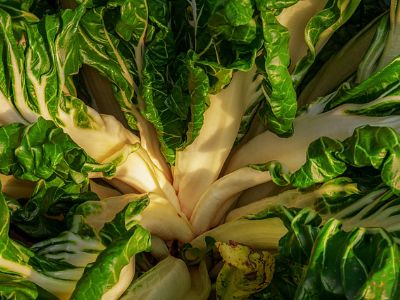
Preparation: Step-by-Step
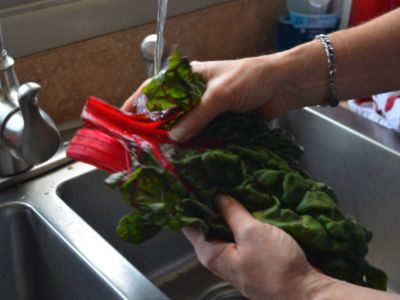
Wash hands. Thoroughly rinse greens to remove any
dirt. Dry with a towel or in a salad spinner. Rewash
greens if needed.
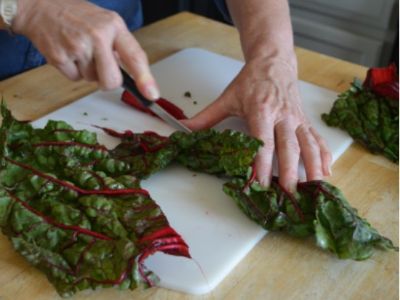
Cut off end of stems using a knife. For large greens, such
as chard and collards, slice on both sides of the stem to
remove. Remove the stem and discard.
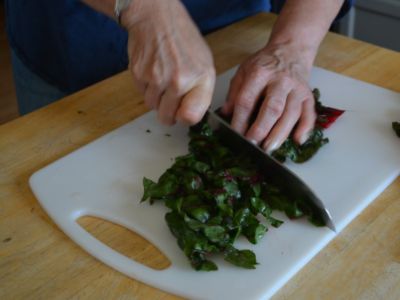
Stack greens and slice into 1/4‐ to 1/2 inch sections.
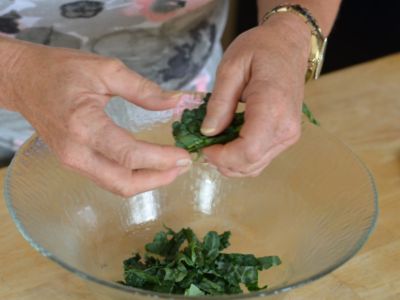
For small or delicate greens, such as lettuce, spinach and
mustard greens, can be hand torn or left whole.
Grow.
- Several leafy greens are grown as spring and fall crops in Montana. Plant
initial crop in spring when soil temperatures reach a minimum of 35F (spinach,
lettuce, arugula), 40F (chard) or 50F (mustard). Small seeded greens such as lettuce
and arugula can be directly sown and do not require soil cover to germinate. Larger
seeds such as spinach and chard can be covered with ¼‐inch of soil. Plants should be
thinned to approximately 2‐6 inch spacing in rows 12‐24 inches apart. Most leafy
greens will create a seed stalk as summer temperatures increase. A late season crop
can be achieved by planting 6 to 8 weeks prior to the first fall frost.
Visit msuextension.org for more information or contact your local MSU Extension office.
Harvest.
- Depending on species and variety, leafy greens can be harvested at 40‐50
days maturity either by removing the whole plant at soil level or selecting older
leaves, allowing the remaining leaves to mature for future harvests. Heading and semi‐heading
leuce varieties take several more days to mature and are harvested as whole plants.
- Choose brightly colored greens with firm, crispy leaves. Avoid dried‐out, yellow,
wilted, dulllooking
or slimy leaves. Young tender leaves are preferred. Once plants have bolted, leaves
tend to be tough and bier. Early harvest ensures the best flavor.
- Store unwashed greens in a bag in the coolest part of the refrigerator for up to one week.
- Greens are cholesterol free and low in calories and sodium. Most of these plants are
referred
to as super foods because they contain phytochemicals, which promote long term health as
part of a nutritious diet. They are also good sources of Vitamin A, C, K, protein and fiber.
Greens are high in folate, a nutrient important for fetal development and calcium.
Blanch or Boil.
- Remove dried or thick stems. Cover the raw greens with water and bring to a boil.
Add greens and blanch: collard, 8‐15
minutes; beet, turnip, and mustard greens, 5‐8 minutes; chard, 2‐4 minutes; baby greens, less than a minute. Cook until desired tenderness.
Braise.
- Cut large greens and keep small greens whole. Remove dried or thick stems. Drizzle
cooking oil in a heated pan, add seasonings if
desired. Cook greens over low heat for about 20 minutes or until desired tenderness. This method is ideal for collards, chard, and kale.
Salad
- Add a variety of raw greens to salads for added flavor, texture, and visual appeal.
To serve tougher greens raw, massage the finely
cut greens with acidic dressing. This will tenderize the greens and enhance the flavor.
Sauté.
- Cut large greens and keep small greens whole. Remove dried or thick stems. Drizzle
cooking oil in a heated pan, add seasonings if
desired. Cook greens by stirring over high heat until desired tenderness, about 5‐8 minutes. This method is ideal for spinach, collards, chard,
bok choy, and mustard greens.
Season.
- To enhance flavor, experiment with low‐sodium seasonings such as basil, bay leaf, celery, seed, garlic, oregano, tarragon, or thyme.
Soup or Entrée.
- Add greens to soups and entrees such as lasagna, quiche, or pizza.
Steam.
- Remove dried or thick stems. Place greens in a pan in a steam rack with a small amount of water and seasonings if desired. Cook on medium heat for 2‐4 minutes (depending on size and age of greens), or until desired tenderness.
For More Information:
Montana State University Extension: msuextension.org
MSU Extension Master Gardener: mtmastergardener.org
MSU Extension Food and Nutrition: nutrition.msuextension.org
MSU Extension Nutrition Education Programs: buyeatlivebetter.org
Date of Publication: November 2015
